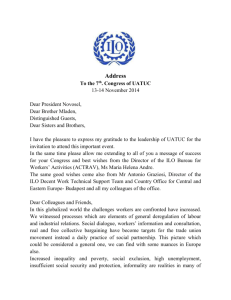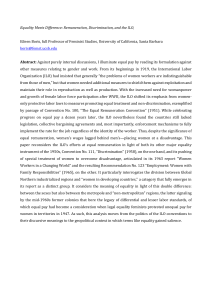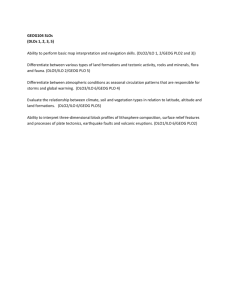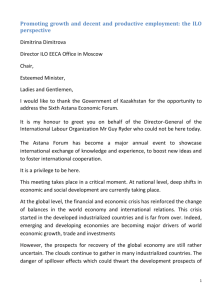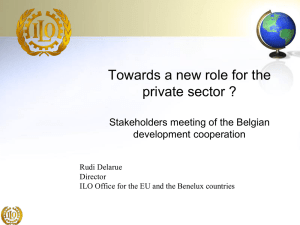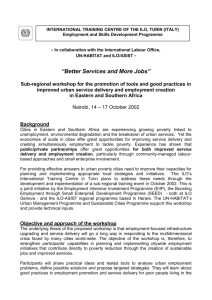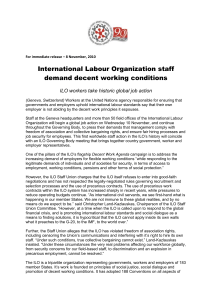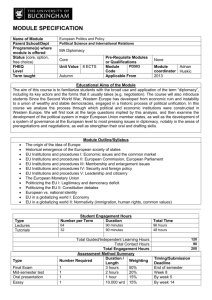View/Open
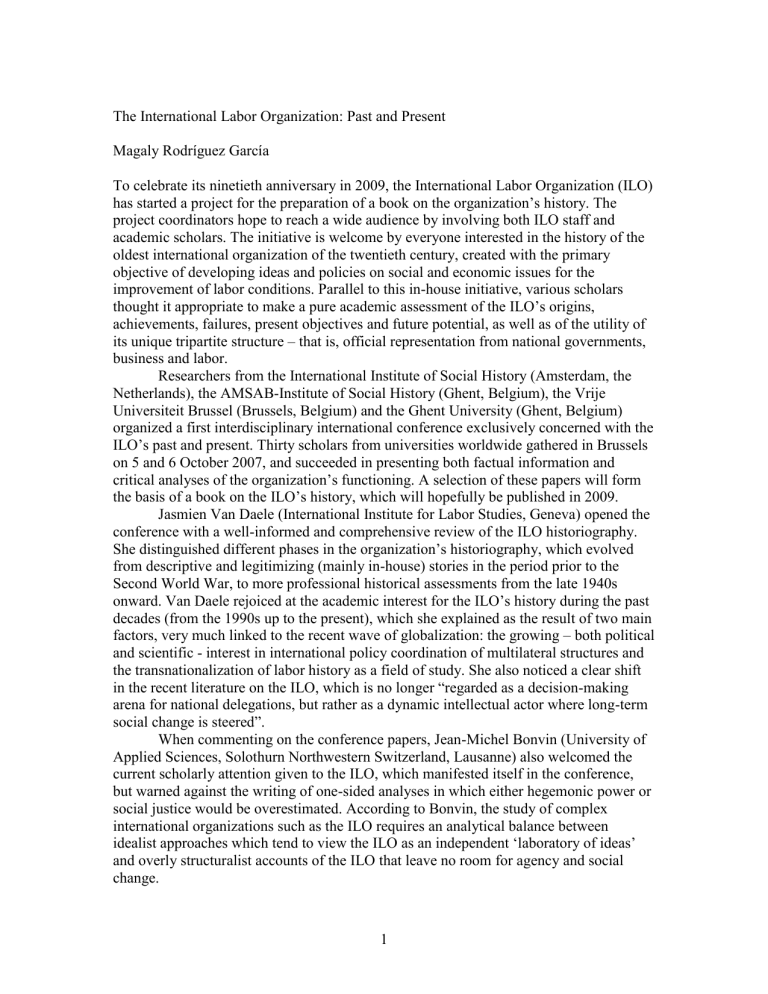
The International Labor Organization: Past and Present
Magaly Rodríguez García
To celebrate its ninetieth anniversary in 2009, the International Labor Organization (ILO) has started a project for the preparation of a book on the organization’s history. The project coordinators hope to reach a wide audience by involving both ILO staff and academic scholars. The initiative is welcome by everyone interested in the history of the oldest international organization of the twentieth century, created with the primary objective of developing ideas and policies on social and economic issues for the improvement of labor conditions. Parallel to this in-house initiative, various scholars thought it appropriate to make a pure academic assessment of the ILO’s origins, achievements, failures, present objectives and future potential, as well as of the utility of its unique tripartite structure – that is, official representation from national governments, business and labor.
Researchers from the International Institute of Social History (Amsterdam, the
Netherlands), the AMSAB-Institute of Social History (Ghent, Belgium), the Vrije
Universiteit Brussel (Brussels, Belgium) and the Ghent University (Ghent, Belgium) organized a first interdisciplinary international conference exclusively concerned with the
ILO’s past and present. Thirty scholars from universities worldwide gathered in Brussels on 5 and 6 October 2007, and succeeded in presenting both factual information and critical analyses of the organization’s functioning. A selection of these papers will form the basis of a book on the ILO’s history, which will hopefully be published in 2009.
Jasmien Van Daele (International Institute for Labor Studies, Geneva) opened the conference with a well-informed and comprehensive review of the ILO historiography.
She distinguished different phases in the organization’s historiography, which evolved from descriptive and legitimizing (mainly in-house) stories in the period prior to the
Second World War, to more professional historical assessments from the late 1940s onward. Van Daele rejoiced at the academic interest for the ILO’s history during the past decades (from the 1990s up to the present), which she explained as the result of two main factors, very much linked to the recent wave of globalization: the growing – both political and scientific - interest in international policy coordination of multilateral structures and the transnationalization of labor history as a field of study. She also noticed a clear shift in the recent literature on the ILO, which is no longer “regarded as a decision-making arena for national delegations, but rather as a dynamic intellectual actor where long-term social change is steered”.
When commenting on the conference papers, Jean-Michel Bonvin (University of
Applied Sciences, Solothurn Northwestern Switzerland, Lausanne) also welcomed the current scholarly attention given to the ILO, which manifested itself in the conference, but warned against the writing of one-sided analyses in which either hegemonic power or social justice would be overestimated. According to Bonvin, the study of complex international organizations such as the ILO requires an analytical balance between idealist approaches which tend to view the ILO as an independent ‘laboratory of ideas’ and overly structuralist accounts of the ILO that leave no room for agency and social change.
1
With regard to the view of the ILO as creator or disseminator of ideas and policies, Marcel van der Linden (International Institute of Social History) emphasized the necessity of differentiating between the ratification of ILO conventions and recommendations by member states and their actual implementation at the national level.
Indeed, as Jeremy Seekings (University of Cape Town) pointed out during the presentation of his paper on the ILO’s involvement in South Africa, Latin America and the Caribbean, “the ILO did shape national agenda on occasion, although shaping the agenda did not guarantee that reforms would follow”. This situation results from the de facto non-binding character of ILO conventions and recommendations, which the ILO itself defines as “legally binding international treaties” although the organization does not posses a mandate to punish offending nations beyond moral censure. Further research in national archives is therefore needed in order to understand the interplay between state and non-state actors in the shaping and implementation of or opposition to ILO social reforms.
Several conference attendants pointed to other pitfalls in the current ILO academic debate, namely the underrepresentation of scholars from middle and lowincome countries and the unequal treatment of the ILO tripartite constituents. Indeed, much of the existent ILO literature is still dominated by North American and Western
European scholars, and the input of employers’ representatives has received far less attention than the role played by government and workers’ delegates within the ILO history.
The conference organizers had anticipated these problems. In their call for papers, they insisted on the necessity to have a balanced overview of all ILO actors, and as many scholars from ‘the South’. Unfortunately, the actual response was poor. There were two contributions by two Latin American scholars (Victoria Basualdo, Columbia University,
New York, and Norberto Ferreras, Universidade Federal Fluminense, Rio de Janeiro), and only one (non-academic) contribution dealt with the ILO and the International
Organization of Employers (Jean-Jacques Oeschlin, Honoray President of the IOE).
In spite of these academic lacunae, various authors proffered valuable and nuanced accounts of the ILO’s history during this two-day conference. For instance, in her contribution on the American Federation of Labor (AFL) and the creation of the ILO,
Elizabeth McKillen (University of Maine) moved from the traditional view of the AFL’s foreign policy being monopolized by its leader Samuel Gompers, and demonstrated how an anti-imperialist left within the AFL contributed to the resistance to the ILO; a situation that contrasted with the European non-Communist left which supported participation in the new organization.
The conference dealt with topics as varied as metropolitan and non-metropolitan labor, war, economic depression, unemployment, ILO’s promotion of social welfare policy in middle and low-income countries and Europe, decolonization, child labor and the ILO’s response to political authoritarianism in Latin America and Eastern Europe. It also explored issues that have often been neglected in traditional ILO literature, for instance the efforts of internationally organized women and of intellectual workers to find a place within the ILO. There was, however, one recurring theme during the whole conference: the importance of the Directors-General in the ILO’s history. Four papers focused explicitly on ILO past leaders Albert Thomas, Harold Butler, John Winant,
Edward Phelan and David Morse. This attention reflects the paramount importance of the
2
ILO executive leadership in the organization’s evolution from a Europe-dominated institution to a worldwide organization, as well as in the ILO’s shift from its traditional focus on labor and social justice to an increased attention to the relationship between social policy, economic development and politics.
Other authors focused on the present and future challenges facing the organization and started by questioning the utility of the ILO’s tripartite model of labor relations. For instance, as Jeffrey Harrod (University of Amsterdam) pointed out, one of the consequences of the trade union monopoly of worker representation within the ILO tripartite structure has resulted in the maintenance of a ‘universal’ organization that represents only a minority of the world labor force. Admittedly, Klara Boonstra (Vrije
Universiteit, Amsterdam) stated, tripartism was for a long time considered “an optimal blueprint for labor relations in the member states”, but the global political economy of the last decades, as well as the increasing importance of multinational corporations and global institutions such as the International Monetary Fund, World Bank and World
Trade Organization are forcing the ILO to reconsider its governing structure, strategy and worldwide involvement. In the discussion that followed the presentation of these papers, the conference participants agreed that the chances of success for the ILO will greatly depend on the willingness and capability of its leaders and constituents to involve more actors in the promotion of a multilateral consensus aimed at stability and progress in the world of work.
3
